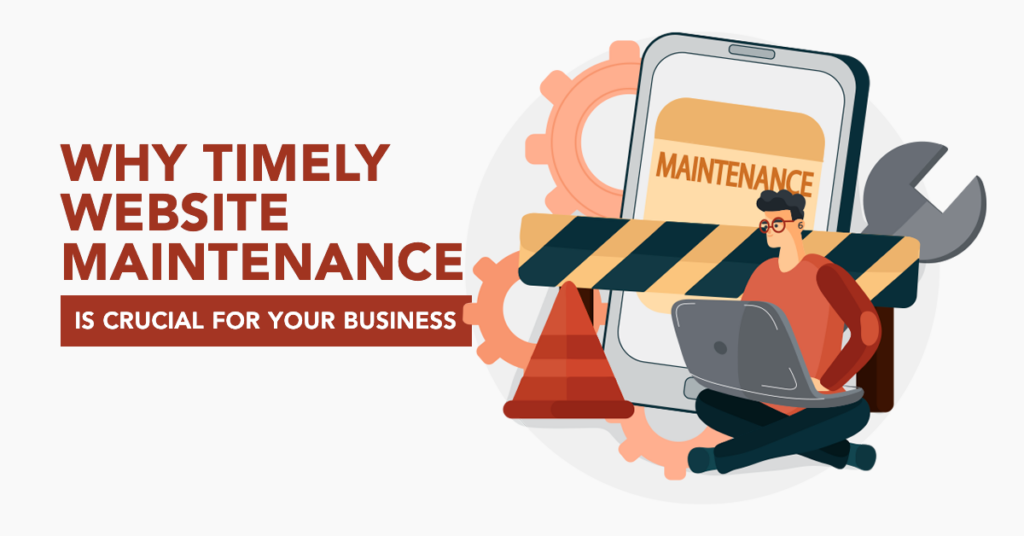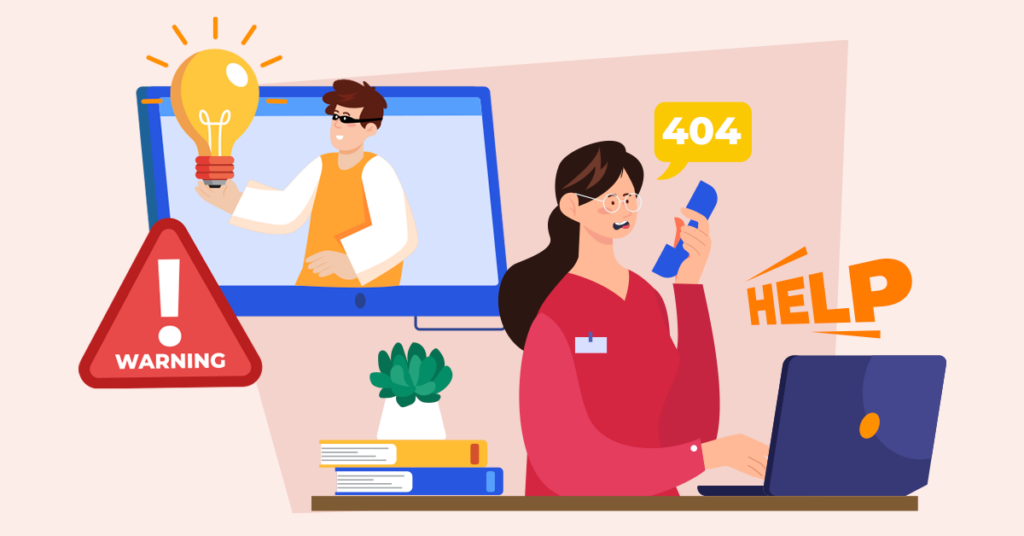
In today’s digital age, a business’s online presence is as crucial as its physical storefront. Timely website maintenance, often overlooked, plays a pivotal role in ensuring the smooth operation and success of a business. This article delves into why regular and professional website maintenance, supported by a well-structured content strategy, is not just a choice but a necessity.
Understanding Timely Website Maintenance
Definition and Importance
Website maintenance is the ongoing process of checking and updating a website to ensure it remains secure, functions properly, and provides an optimal user experience. This involves a variety of tasks, including updating software and plugins, backing up data, checking for broken links, optimizing website speed, and reviewing and updating content.
Regular website maintenance is crucial for several reasons. Firstly, it helps prevent security breaches and data loss by ensuring that all software and plugins are up to date and that backups are regularly made. This proactive approach safeguards your website against potential cyber threats and ensures that your data is always protected.
Secondly, regular maintenance significantly improves website performance. By optimizing website speed and ensuring that web pages load quickly, you enhance the user experience, which can lead to higher engagement and lower bounce rates. A well-maintained website also ensures that all web pages are easy to navigate, providing a seamless experience for visitors.
Thirdly, website maintenance plays a vital role in improving search engine rankings. Search engines favor websites that are regularly updated with fresh, relevant content. By consistently updating your website content and fixing broken links, you signal to search engines that your site is active and valuable, which can improve your position on search engine results pages.
Finally, regular website maintenance ensures that your content remains relevant and engaging. This is particularly important in today’s fast-paced digital world, where outdated information can quickly lead to a loss of credibility. By keeping your website up to date, you ensure that your audience always has access to the most current and accurate information.
Before we dive in deeper, understanding the importance of website maintenance is essential for any business or organization looking to achieve its online goals. Regular maintenance not only keeps your website secure and functional but also enhances its performance, improves search engine rankings, and increases web traffic. By investing in regular website maintenance, you can ensure that your website remains an effective tool for reaching your target audience and achieving long-term success.
Enhancing Website Performance and User Experience

Website Performance and User Experience
Enhancing website performance and user experience is a vital aspect of website maintenance, influencing customer satisfaction and search engine rankings. Regular website maintenance ensures your site functions properly, offering a seamless experience to users by optimizing web page loading times. Key components include load speed and mobile responsiveness.
In today’s fast-paced digital world, users expect quick load times; slow loading can lead to higher bounce rates. Planned maintenance, such as optimizing images and streamlining code, significantly improves load times. Ensuring your website displays correctly on all devices, especially mobile, is crucial as more users access sites via smartphones and tablets.
Regularly monitoring your site’s performance helps reduce downtime and maintain high-quality metrics, which are essential for addressing performance issues that can impact your site’s credibility and search engine visibility.
Content and Security Updates
Updating content is essential for user engagement and search engine optimization. A well-structured website content strategy is essential for ensuring that updates are both relevant and engaging for users. Fresh content keeps visitors engaged and signals search engines that your site is active, improving rankings on search engine results pages.
A content management system (CMS) plays a crucial role in website security and maintenance by facilitating regular updates for the CMS itself, as well as for themes and plugins, to address vulnerabilities and protect against cyber threats. Security is another critical aspect. Regular updates and patches protect against security vulnerabilities, safeguarding user data and your business reputation.
Neglecting this can lead to data loss and incur high costs in damage control and lost trust. Consistent maintenance prevents higher future costs, as early issue detection is often easier and less expensive to fix.
Proactive Maintenance Benefits
Regular and professional website maintenance is essential for optimal website function. It enhances user experience by improving load times, ensuring cross-device compatibility, updating content, and maintaining robust security.
This approach retains and attracts customers while positively impacting search engine rankings, contributing to digital marketing success. Moreover, consistent maintenance helps avoid unexpected expenditures by keeping the maintenance budget under control.
Investing in ongoing website maintenance is crucial for ensuring a well-maintained site that functions smoothly and remains up to date. It supports a positive user experience, enhances search engine optimization, and secures your online presence. This proactive approach not only protects your business but also contributes to long-term success in the digital landscape.
Securing Your Online Presence

A Priority for Businesses
In today’s digital landscape, securing your online presence is paramount for both business integrity and customer protection. A poorly maintained website can severely impact a brand’s credibility and professionalism, leading potential customers to question the reliability of the business. Utilizing tools like Google Search Console can help identify and fix security vulnerabilities, further protecting your website.
Cyber threats are becoming increasingly sophisticated, making regular security updates and patches essential components of professional website maintenance services. These measures are crucial to safeguarding against vulnerabilities that could lead to data breaches and loss. Effective website maintenance includes routine security scans and software updates to detect and address potential issues before they escalate, ensuring your digital platform remains in optimal working condition.
The cost of neglecting website security can be substantial, with data loss leading to severe consequences such as loss of customer trust, legal issues, and financial burdens. Regular security checks and updates are minimal compared to the potential high costs incurred from a security breach.
Planned maintenance serves as risk management, helping to avoid hidden fees and unexpected expenses associated with compromised websites. A secure website fosters trust, particularly for ecommerce sites where transactions involve sensitive information.
Proactive Defense Against Cyber Threats
Proactive website maintenance is not just about fixing issues as they arise; it’s about taking steps to ensure your site remains safe from evolving cyber threats. This approach protects your business and customers while supporting your website’s performance, contributing positively to your digital marketing strategies.
A secure website is trustworthy, encouraging customer engagement and purchases. Regular security updates, as part of your website maintenance plan, are vital in building and maintaining this trust. Investing in ongoing website maintenance is essential for a secure online presence. It helps protect against potential cyber-attacks, supports your website’s performance, and enhances your overall digital marketing success.
By prioritizing security through regular maintenance, businesses can ensure a reliable and safe digital environment for their customers, fostering long-term trust and loyalty.
Boosting Search Engine Rankings to Keep Clients Coming

Enhancing SEO Through Website Maintenance
Boosting search engine rankings is a crucial outcome of effective website maintenance, directly impacting the success of any online business. Regular maintenance plays a significant role in optimizing a website for search engines, known as search engine optimization (SEO).
This process involves various tasks that enhance your site’s position on search engine results pages. One key aspect is ensuring your website’s content is up to date and relevant, as search engines favor sites offering fresh, valuable content. Routine updates, such as adding new blog posts and removing outdated content, keep your website dynamic and engaging for visitors.
Technical Health and SEO
The technical health of your website is vital for SEO and overall website’s performance. Search engines evaluate factors like load speed, mobile responsiveness, and the presence of broken links to determine rankings. Regular maintenance ensures these elements are optimized.
For example, ensuring your web pages display correctly on mobile devices and minimizing load times can significantly boost your site’s performance in search rankings. Additionally, regular maintenance helps identify and fix SEO issues like missing meta descriptions or poor image optimization, ensuring adherence to best practices.
Moreover, maintaining technical infrastructure, such as web hosting and domain registration, is essential. A reliable hosting service minimizes downtime, while timely domain renewal prevents service lapses – both impacting search engine considerations. Professional website maintenance services often include regular SEO audits to ensure your website aligns with search engine algorithms.
Constant website maintenance is a multifaceted approach that significantly impacts SEO. It involves updating content, optimizing technical aspects like load speed and mobile responsiveness, and ensuring overall site health. Investing in ongoing maintenance allows website owners to improve search engine rankings, attract more visitors, and achieve digital marketing success.
Avoiding High Maintenance Costs in the Long Run

Smart Financial Planning with Website Maintenance
Consistent website maintenance is a strategic financial move that prevents high long-term costs. Investing in a website maintenance package is cost-effective compared to hiring dedicated internal resources. Many website owners hesitate to budget for ongoing maintenance, seeing it as an extra expense.
However, regular upkeep offers significant cost savings by catching issues early, preventing them from becoming expensive problems. Routine checks identify security vulnerabilities, allowing for timely updates and patches to avoid costly breaches.
Boosting Performance and SEO
Regular maintenance ensures your website runs smoothly, optimizing load speed and displaying pages correctly. This not only enhances user experience but also prevents revenue loss from downtime, especially important for ecommerce sites. A well-maintained website ranks higher in search engine results, driving organic traffic and reducing the need for costly advertising. Keeping content fresh gives your site a competitive edge in SEO.
Additionally, tracking maintenance costs within a comprehensive plan aids financial planning and control. This approach helps allocate a budget for upkeep, avoiding unexpected expenses and hidden fees, which is vital for small businesses with tight budgets. Consistent maintenance minimizes risks associated with emergency repairs and downtime, keeping your website in optimal condition.
Understanding that web maintenance is part of the total cost of website ownership ensures long-term success. It extends the site’s life and maximizes return on investment, making it a crucial element of smart financial planning for website owners.
Ensuring Compatibility with Modern Technologies

Mobile Responsiveness
Ensuring your website is mobile-friendly is crucial, as most users access the internet via smartphones and tablets. Regular maintenance should focus on testing and updating your site’s design to ensure it displays correctly on various devices. This not only improves user engagement but also boosts search engine rankings.
Embracing New Technologies
To stay competitive, your website must integrate the latest tools and software updates. Website maintenance tasks are crucial in embracing new technologies, ensuring your site remains updated and functional. Regular maintenance allows you to leverage advanced analytics and content management systems, enhancing your site’s functionality and keeping it competitive in the digital landscape.
Enhancing Load Speed
A fast-loading website is essential for both user experience and search engine optimization. Routine maintenance should include optimizing images, streamlining code, and utilizing efficient hosting solutions to ensure quick load times and a smooth user experience.
Continuous Adaptation
Adapting to the ever-evolving digital environment is vital. Regular website maintenance involves ongoing improvements in design, functionality, and performance, ensuring your site remains relevant and effective in attracting and retaining visitors.
Maintaining a Professional Image, with Minimal Maintenance Expenses

The Role of Visual Appeal
Maintaining a professional image online is essential for any business, and regular website maintenance is key to achieving this. A visually appealing website creates a positive first impression for potential customers. By ensuring that the design is modern and functional, and that images and layouts are up to date, businesses can demonstrate reliability and a commitment to quality. Moreover, ensuring that web pages display correctly across various devices is crucial, as mobile device usage continues to rise.
Ensuring Optimal Functionality
The functionality of a website is integral to maintaining a professional image. Effective web maintenance services play a crucial role in ensuring optimal functionality by addressing issues like broken links, outdated content, and slow load speeds. Issues like broken links, outdated content, and slow load speeds can detract from user experience and harm your brand’s reputation.
Regular maintenance tasks such as optimizing load speed and fixing broken links ensure the website operates smoothly, providing a seamless user experience. This proactive approach prevents potential issues from escalating, preserving the integrity of your online presence.
Strengthening Website Security
Website security is a vital component of maintaining a professional image. Regular security updates and patches protect against vulnerabilities, safeguarding both your business and customer data. A secure website enhances your reputation as a trustworthy entity, which is particularly important for ecommerce sites handling sensitive transactions. By prioritizing security, businesses can avoid costly breaches and maintain customer trust.
Enhancing SEO Strategies
Search engine optimization (SEO) is crucial for maintaining an authoritative online presence. Regular website maintenance involves updating SEO strategies to improve search engine rankings. By keeping content fresh and relevant, businesses can increase their visibility on search engine results pages. A higher ranking not only boosts credibility but also attracts more visitors, contributing to business growth in a competitive digital landscape.
Only Incur Maintenance Costs that Would Support Your Digital Marketing Strategies

Integrating Website Maintenance with Digital Marketing
Effective website maintenance is essential for supporting digital marketing strategies. Utilizing a professional maintenance service can save time, money, and resources while ensuring your website remains in optimal condition.
A well-maintained website forms the foundation for search engine optimization (SEO), content marketing, and social media engagement. By keeping your site updated with fresh content, ensuring mobile compatibility, and optimizing load speeds, you enhance its visibility on search engine results pages, driving organic traffic and boosting your digital marketing efforts.
Enhancing User Experience and Conversions
The performance of your website is integral to user experience. A site that functions smoothly, without broken links or outdated content, encourages visitors to engage more with your content, reducing bounce rates and increasing conversion opportunities. Regular maintenance ensures optimal functionality, which is crucial for effective digital marketing strategies, leading to higher sales, sign-ups, or other targeted actions.
Strengthening Security and Trust
Website security is vital for maintaining customer trust and brand reputation. Regular security updates and patches protect against vulnerabilities, ensuring user data safety. This is especially important for ecommerce sites, where secure transactions are key. A secure website fosters trust, a critical component of successful digital marketing, encouraging customer loyalty and repeat visits.
Leveraging Analytics for Strategy Optimization
Website maintenance also aids in tracking the effectiveness of your marketing strategies. By regularly updating your site, you can implement the latest analytics tools to gain insights into user behavior and campaign performance. This data is invaluable for refining your digital marketing strategies, ensuring they are built on a strong, effective, and reliable foundation.
Keeping Your Website Up to Date with Latest Information

Fresh Content for Relevance
Regular website maintenance is essential to keep your site relevant in the digital world. Frequent updates ensure that all content, including text, images, and videos, remains current, which is crucial for customer satisfaction and trust. This is particularly important for ecommerce businesses where accurate product information is key. Fresh content not only informs your audience but also enhances your site’s dynamic presence, positively impacting SEO.
Boosting SEO
Updating your website is a critical component of SEO strategy. Search engines prioritize sites with regularly updated content, as it indicates activity and relevance. By adding new blog posts, articles, and news updates, you can improve your site’s ranking on search engine results pages, increasing visibility to potential customers. Regular updates also involve technical maintenance, like software and plugin updates, which are vital for security and functionality.
Technical Health and Security
Regular updates include checking for broken links and ensuring optimal site performance. Website maintenance tasks play a crucial role in ensuring a website remains operational and relevant by protecting the site’s integrity, enhancing performance, and keeping content fresh.
Broken links can harm user experience and SEO, while updates protect against security vulnerabilities. Maintaining load speed and mobile responsiveness is crucial for engaging site visitors, especially with the rise in mobile device usage. These technical aspects are integral to a well-maintained website.
Professional Online Presence
Ongoing website maintenance ensures a professional, trustworthy, and engaging online presence. By focusing on content updates, SEO strategies, technical health, and performance, businesses can keep their websites competitive.
Long-Term Financial Savings with a New Account

Financial Benefits of Regular Maintenance
Investing in periodic website maintenance can lead to significant long-term financial savings for businesses. While some may view maintenance services cost as an additional expense, proactive upkeep can substantially reduce the total cost of website ownership over time by improving the website’s performance. Planned maintenance prevents costly overhauls by addressing issues like software updates and broken links, ensuring the website functions properly and avoiding major problems.
Reducing Downtime and Enhancing Security
Periodic maintenance helps avoid downtime, which can be costly in lost revenue, especially for ecommerce sites. Keeping your website up to date and running smoothly keeps customers engaged and reduces the risk of losing sales due to technical issues. Additionally, regular security updates and patches are critical, protecting against data breaches that could damage your reputation and customer trust.
Supporting SEO strategies is another financial advantage of consistent maintenance. A well-maintained website ranks better in search engine results, attracting organic traffic and reducing the need for expensive advertising. By maintaining fresh, relevant content, businesses can improve search engine visibility and reduce reliance on paid marketing methods.
Lastly, tracking maintenance costs and having a clear maintenance budget helps businesses plan their finances effectively. Understanding the average costs involved in maintaining a website avoids hidden fees and unexpected expenditures. In conclusion, periodic website maintenance is a cost-effective strategy that ensures long-term financial health and success for your online presence.
Enhancing Customer Trust and Loyalty

Building Customer Trust Through Website Maintenance
Effective website maintenance is crucial for enhancing customer trust and loyalty, essential for online success. Regular and professional website maintenance services ensure a website is functional, secure, and up-to-date, key factors in building trust. A well-maintained site, free from broken links and outdated content, creates a professional image. Fast load speeds and current information instill reliability, particularly for ecommerce sites where secure transactions are vital.
Ensuring Security and SEO
Security is critical for customer trust. Regular updates protect against security vulnerabilities, preventing data loss and safeguarding sensitive information. This proactive approach reinforces customer confidence in your brand. Additionally, consistent maintenance supports SEO efforts, boosting search engine rankings. A higher ranking enhances visibility and credibility, while fresh content keeps the site engaging, further building trust and loyalty.
Adaptability is another benefit of regular maintenance. A well-maintained website can handle increased traffic and adapt to changing technology and customer expectations. This ensures the website remains functional and efficient, providing a seamless user experience that encourages return visits.
Constant website maintenance enhances customer trust and loyalty by ensuring a secure, functional, and up-to-date site. This creates a positive user experience, fostering trust and encouraging repeat visits. Ultimately, it supports long-term business success by building a loyal customer base that values and trusts your brand.
Getting A Website Maintenance Services to Make an Impact

In conclusion, website maintenance is a vital aspect of managing a business’s online presence. It enhances user experience, secures data, and boosts SEO rankings. Regular maintenance leads to improved performance, cost savings, and a stronger online presence. Investing in professional website maintenance services is a smart move for any business.
For exceptional website maintenance services, contact WDD Malaysia. Our expert team ensures your website operates smoothly and remains up to date with the latest trends and security measures. From updates and security patches to performance enhancements, we have you covered. Reach out to WDD Malaysia today and keep your website in optimal condition!





